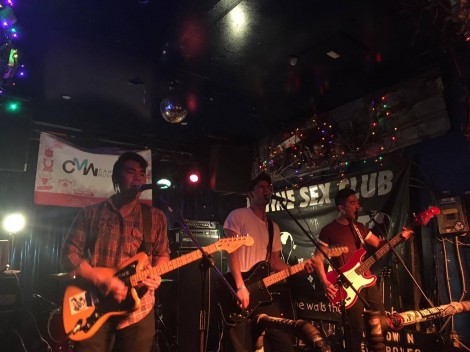[dropcap]R[/dropcap]ipped tights and public drinking had a moment during Canadian Music Week (CMW). With headliners like SWMRS, Foreign Diplomats, and Dilly Dally, the festival shed a spotlight on punk rock and the Do-It-Yourself (DIY) culture.
The CMW industry conferences and evening performances were characterized by an unrelenting spirit of youth and DIY mentality. The conferences were hosted at the Sheraton Hotel, and they detailed practical tips for independent artists, such as touring ethics and etiquette and engagement via social media tools. Moguls and musicians alike advocated for individuality, authenticity, and an objection to mass-production — an unusual notion to encounter in the modern music industry.
Staple venues across the city like Sneaky Dee’s, Bovine Sex Club, and Lee’s Palace, proved to be the warmest hosts to many emerging DIY bands.
The DIY aesthetic of tech-dependent genres, like electronica and hip-hop, emerges primarily through manipulating technology into instruments, such as laptops or digital sample kits available online. Referred to as ‘bedroom producers,’ these artists can record and publish their music autonomously.
River Groves is a high-energy punk band from Streetsville in the Peel Region that participated in CMW this year. According to bassist Brian, the only expectation a DIY band should have of itself is a collaborative effort between band members. As a band, the members “act as a producer in tandem” with their studios.
Kevin, the vocalist, adds that DIY bands should consider looking to professional agencies for booking or management only when they can “no longer balance the managerial and the business side of [the] music with the art of it.” An inability to “coordinate scheduling and band practises” or to fulfill other basic, day-to-day responsibilities would signal the changing need for a band.
[pullquote]Hometown glory and building strong relationships with the local community can prove to be more beneficial than opting for professional marketing.[/pullquote]
For now, River Groves is largely self-sufficient. “We book our own shows. We usually drop our own merch. We take care of all that stuff,” says Kevin.
Promotion is often the most coveted perk from an independent band’s perspective. Hometown glory and building strong relationships with the local community can prove to be more beneficial than opting for professional marketing.
According to Brian, “Independent artists can get away with a lot for a while. I think they really should — they could and they should be DIY for as long as possible, instead of rushing into a management deal or a record deal that they don’t really need.” Kevin adds, “There’s a respect level too, when you’re doing your own booking, promotion. People really notice that.”
Bike Thiefs, another band from Peel, consists of Kris Pandeirada, Andrew Fasken, and Marko Woloshyn. While the band knows people in the commercial industry, they “haven’t for the past two releases tried to court any labels. We’ve tried to do ourselves.” The label system today relies heavily on exposure.
To Marko, “it depends on what you’re signing up for. Some labels will build a pop star, others will just take care of distribution and PR. Some labels will help you build tours. It depends on how much money the label has, and how much they want to put into you — risk.”
For some DIY bands, signing to a label is no more than attaching to a reputable name and receiving no more assistance beyond a commercial boost. “We’ve seen friends of ours sign to a label… it’s so far proved to be pretty fruitless. I don’t know the intricacies of it but it doesn’t look like they’ve helped them that much,” says Marko.
In the case of Bike Thiefs, each member works part-time for recording money. Every dollar earned by band members goes directly back into the band. With recording falling directly on their shoulders, word-of-mouth and a personalized approach to marketing become crucial. Bike Thiefs also depends on their online presence and a keen awareness of media consumption for promotion.
They prefer to concentrate their recordings into small releases. “The EP thing is the smartest route, because people don’t really have huge attention spans…To a lot of people, we’re still going to be making a first impression, so you want your best songs, and you want the smallest package, the most easily digestible package for your song.”
The band utilizes in-house graphic design skills to create, distribute, and maximize profit from merchandise. They use silkscreen printing to press graphics onto shirts they purchase in bulk. This reduces the costs that the band would otherwise be invoiced for when outsourcing and printing. In punk culture, manufacturing garments is a part of the genre’s tradition, emphasizing individualism and a rejection of mainstream fashion.
In the case of DIY, successful bands have to take a more personal approach to booking, recording, and distributing their music. Since many expenses revolve around procuring, mastering, and recording live instruments, DIY bands require a more hands-on approach than other genres, with more practical and financial investment from their band members.



